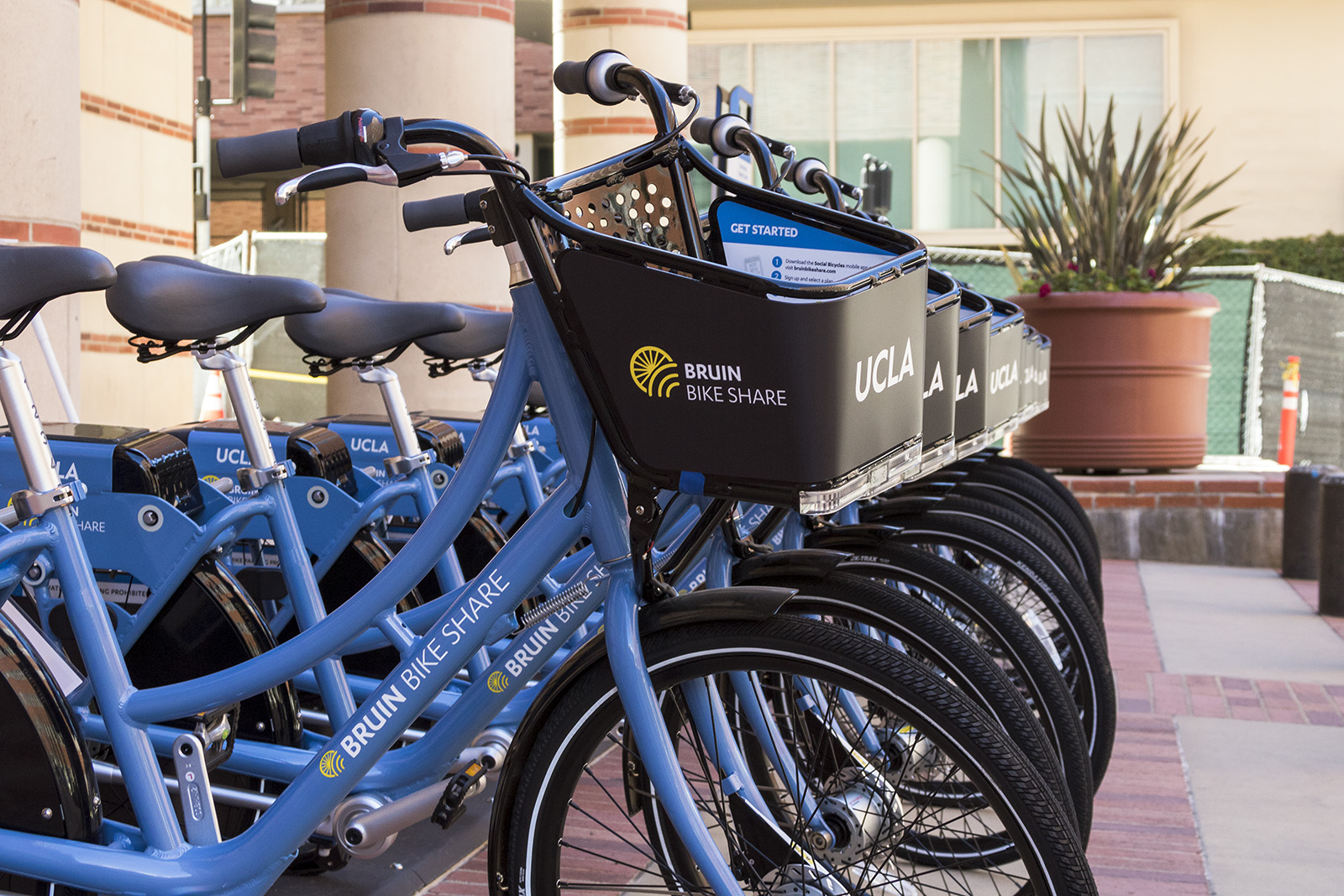The Quad: Bruin Bike Share sees competition with e-scooters in year of its release

A little more than a year since the Bruin Bike Share program was launched, UCLA Transportation told the Daily Bruin the usage of the program in Westwood dropped by about 20 percent since the arrival of e-scooters like Bird and Lime in Westwood. (Daily Bruin file photo)
By Brenda Chan
Nov. 21, 2018 12:09 p.m.
Accidentally snoozing your alarm too many times is no longer an issue thanks to the wide selection of transportation options around campus.
There are Bird, Lime and now Jump e-scooters all throughout Westwood, but before those came, there was Bruin Bike Share.
Bruin Bike Share was launched in October 2017 and has since expanded its network to join bike share systems in Santa Monica, Beverly Hills and West Hollywood to form Bike Share Connect. According to UCLA Transportation, it is the first integrated bike share network in Los Angeles with nearly 120,000 members.
[Related: The Quad: New bike share program useful but possibly more efficient in Westwood]
With the rising popularity of e-scooters, the usage of Bruin Bike Share appears to have declined. According to UCLA Transportation, there has been an estimated 20 percent decrease in usage of Bruin Bike Share and a reported 30 percent decrease in usage of the bike share system of Santa Monica since the popularization of e-scooters. These numbers indicate that there seems to be a correlation between the increase in e-scooter users and the decrease in Bike Share users.
Bike share programs in the U.S. are mostly either initiated, funded, administered, operated or permitted by the local government. In Los Angeles, the Metro Bike Share system is administered by the Los Angeles County Metropolitan Transportation Authority. Most often, bike share systems are mandated by the government that also designates stations for these bikes. As a result, bike sharing systems don’t encounter problems of causing chaos on sidewalks like with e-scooters.
Interestingly, Bird and Lime have been connected to a decrease in Bruin Bike Share usage, despite a more contentious relationship with local governments. Bird and Lime are startups – they have experienced issues with local governments due to overcrowding of the sidewalk and with users getting citations. Startup companies like these also have the tendency to pop up without notifying the local government beforehand, thereby causing unexpected inconvenience to pedestrians and road users.
[Related: Bird rustles feathers but the scooters will nest in LA for now]
Annelie Rugg, director and humanities CIO at HumTech at UCLA, signed up for Bruin Bike Share in September. Rugg said she thinks Bruin Bike Share has made her travel at work much easier, as she used to get around campus and Westwood with her own bike prior to signing up for Bruin Bike Share. Rugg said she no longer has to worry about her bike getting stolen or having to find a spot to securely lock her bike on campus.
Rugg said she’s noticed the Bruin Bike Share bikes feel a bit heavier than average bikes. As an avid cyclist herself, the heaviness of the bikes does not present an issue to Rugg when tackling the hills, but it may be a more difficult feat for people who are not seasoned cyclers. On the other hand, companies like Bird and Lime provide more lightweight electric transportation that could be helping cause the popularity of these e-scooters.
“(Bruin Bike Share) is exactly the right idea, the kind of thing we need, but (they) need to tweak it a little,” Rugg said.
While Rugg said she praises the service for being particularly well-maintained, she believes a few improvements can be made. Besides providing lighter bikes that would be easier to ride uphill, Rugg said she suggests more hubs be added to the UCLA campus. Adding more stations would make it more convenient for users to get straight to their destination without having to worry about additional walking after parking their bike, said Rugg.
Perhaps the popularity of Birds and other e-scooters comes from the fact that users can drop them off and leave them practically wherever they please. However, this can also get the scooters into some trouble: While the bikes from Bruin Bike Share are protected by the designated stations for dropping them off, it’s not an uncommon sight to find a Bird or Lime that’s been vandalized or mishandled.
Though Bruin Bike Share might seem a bit more expensive than e-scooters at face value, it’s actually more affordable. It is currently priced at $7 a month or $72 a year with 90 minutes of ride time per day. On the other hand, if one were to use an e-scooter to get around campus, they could end up spending more than $30 a month with just four minutes of ride time per day.
Since Bruin Bike Share has recently expanded its network, members of the UCLA community who commute from other parts of the city would benefit, as there are now bike hubs available across a vast area spanning from Santa Monica to West Hollywood. Commuter Bruin Bike Share users are able to utilize these services and conveniently station their bikes instead of relying on public transport or having to drive and find parking.
Bruin Bike Share is a sustainable way to travel around campus and Westwood. While e-scooters and Bruin Bike Share both have their pros and cons, Bruin Bike Share could be the more economical choice for those seeking a long-term transportation plan.


